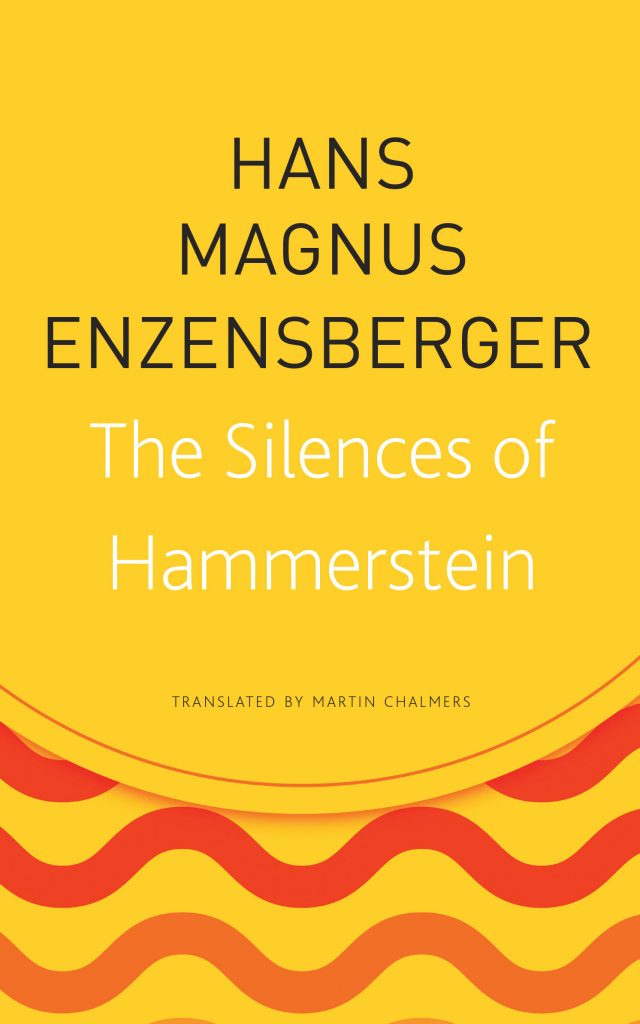The Silences of Hammerstein is a book by Hans Magnus Enzensberger about a German general and his family, reflecting important periods of 20th-century German history.
The book is not a novel, but also not a normal non-fiction book, but to a certain extent a hybrid – while the author mainly follows the diverse sources on the life of the Hammersteins and retells and classifies them like a good historian, there are also fictional elements: Enzensberger “interviews” his long deceased characters and in these fictitious conversations aspects are reflected that usually go unnoticed in a non-fiction book, such as the supposedly sometimes different view of the historical persons on the events described in the book or things about which the available sources do not provide any information, but which are of equal interest to author or reader.
Kurt von Hammerstein-Equord (1878-1943) came from old but impoverished Prussian nobility. For impoverished aristocrats, the military was the only possible career at that time and so Kurt von Hammerstein entered a cadet school as a child, where he made friends that were to be of great importance for his later successful career. His military career was crowned in 1930, when the general became chief of the army command and thus supreme commander of the Reichswehr, a post he gave up after Hitler came to power because he was hostile to the Nazis.
Hammerstein experienced his youth in the German Empire, then the First World War at the front, the difficult years after WWI and the Versailles Treaty, which gave Germany sole responsibility for the war, Germany’s foreign policy rapprochement with the Soviet Union and the close military cooperation between the Red Army and the Reichswehr, the turbulent final phase of the Weimar Republic, the rise of Hitler and the Nazi dictatorship. An eventful life indeed, a life in which someone in a prominent military position like Hammerstein often faced difficult and far-reaching decisions. For this reason alone the book about this relatively unknown general is of great interest.
Apart from the historical dimension, the author – and of course the reader – wonders what kind of person the hero of this book was. For example: Was Hammerstein a good husband and father? The record is mixed here – as is the case with probably all husbands and fathers. Hammerstein was without doubt devoted to his wife and he had married for love. He had pushed it through against the initial resistance of his future father-in-law. General von Lüttwitz, Hammerstein’s superior for a long time, valued the young officer on the one hand, but considered his daughter’s marriage to this have-not to be inappropriate. In the end Lüttwitz agreed so as not to stand in the way of his daughter’s happiness.
Later, during his absences during the war and thereafter, Hammerstein’s wife often felt that she was on her own. The by no means brilliant salary of a Prussian (later German) general staff officer meant that domestic staff (except for a nanny) was not available and the wife not only had to keep a tight budget to obtain the household with many children, but also to manage the a lot of social obligations as the wife of a general.
In addition, Hammerstein had the habit of leaving domestic and official responsibilities behind and going on extensive hunting trips. Officially, that never really seems to have gotten him into trouble. The important personalities within the army and the Reichswehr Ministry were his personal friends, who liked to turn a blind eye when the general, who was valued for his abilities, was again untraceable for a while. In his own family, these absences were not so well received.
Even as a father, he was often absent. This does not mean that he was not interested in his children, rather he gave them a great deal of freedom from an early age and never interfered in his children’s personal or political affairs. He knew that three of his daughters were members of the Communist Party and also had Jewish friends and accepted it without any ifs or buts, just like the role that two of his sons later played in being involved in preparing the assassination attempt on Hitler.
Hammerstein’s sloppy handling of military secrets enabled his daughters to make many important documents available to the Soviets. Hammerstein was also in the Soviet Union for a longer time in the 1920s and maintained friendly relations with some high-ranking military figures there, in particular with Marshal Tukhachevsky.
The object of this German-Soviet military cooperation was, on the one hand, a transfer of know-how from which mainly the Soviets benefited. On the other hand, the agreement gave ‘unofficial’ units of the Reichswehr – the so-called Black Reichswehr – an opportunity to train in the Soviet Union, particularly with technologies that were forbidden to Germany according to the Versailles Treaty, such as the airforce. Hammerstein was the man to organize the whole scheme from the German side.
How is Hammerstein to be classified politically? Like most officers of his time, he had a conservative upbringing, but apparently without the strongly anti-Semitic views that were common at the time. He was skeptical and opposed to political radicalism. He distanced himself from the Kapp Putsch early on, although it was organized by General von Lüttwitz, his father-in-law (Kapp was just a figurehead). After meeting Hitler personally at a dinner in the late 1920s, he knew the man was a nutcase. After Hitler was appointed Chancellor by de facto dictator Hindenburg (without the participation of the Reichstag), Hammerstein, who was also called the Red General because of his alleged sympathies for the political left, resigned. After 1933 he belonged to the resistance groups against Hitler within the military.
In this context it is noteworthy that what was probably the most promising opportunity to end the dictatorship of Hitler and the Nazis went unused in 1934. In the so-called ‘Night of the Long Knives’, during which Ernst Röhm and several other SA leaders were arrested and murdered, the new regime also used the situation to get rid of other potential enemies of their regime, including Hammerstein’s childhood friend, Kurt von Schleicher, a former Chancellor. While the Reichswehr shed no tears for the dead SA leaders, it was different with the murder of Schleicher and the ‘beheading’ of the army leadership. At this point in time, a military putsch against Hitler would have had a good chance of success, but the window of opportunity passed due also to Hammerstein’s reluctancy to make a decision.
What is also interesting about the Hammerstein family members is that none of them were actually Nazis and that the Nazis were always aware regarding their critical attitude towards the regime. Hammerstein himself died in 1943 from a tumor that was treated too late. The family refused the state funeral and ‘forgot’ Hitler’s funeral wreath, so the event took place with close family and friends only. In the final phase of the war, the Hammerstein family was taken into Sippenhaft (clan custody), but they survived an odyssey under SS guards unscathed.
The final chapters of the book are devoted to the post-war fate of Hammerstein’s surviving wife and children. It is interesting how many connections there were between the Hammersteins and important personalities not only in German history, without this being pointed out as particularly noteworthy by any member of the family in their recollections and memoirs. It is not really clear whether this characteristic of not making a fuss about oneself is typical of the Prussian nobility, as the author seems to believe, or whether it is rather a trait of this particular family.
A consistently interesting book, of particular interest to those readers who already have some prior knowledge of German history.
I read the excellent English translation by Martin Chalmers. Seagull Books in Calcutta is one of the best publishers of translated literature in the Anglophone world. Check out their programme (if you haven’t done it yet)!

Hans Magnus Enzensberger: The Silences of Hammerstein (tr. Martin Chalmers), Seagull Books, Calcutta London New York, 2017
© Thomas Hübner and Mytwostotinki, 2014-22. Unauthorized use and/or duplication of this material without expressed and written permission from this blog’s author and/or owner is strictly prohibited. Excerpts and links may be used, provided that full and clear credit is given to Thomas Hübner and Mytwostotinki with appropriate and specific direction to the original content.








 Facebook
Facebook RSS
RSS Twitter
Twitter